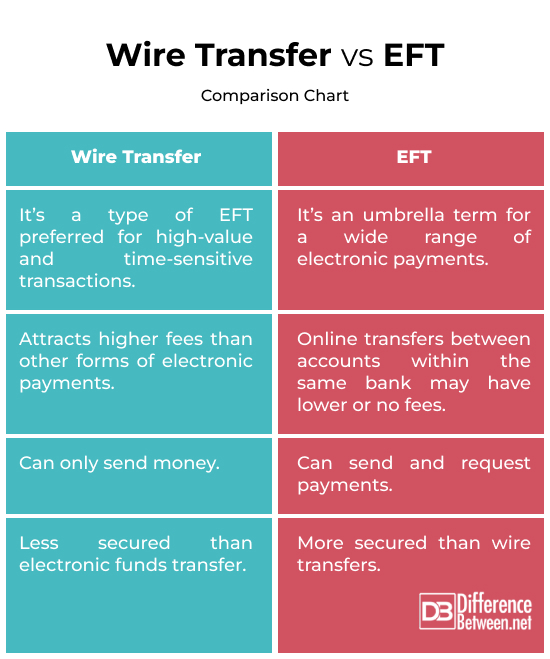Difference Between Wire Transfer and EFT
Over the course of time, the manner in which money is distributed has changed in tandem with the transformation of its essence from physical to computer information bits. As time has progressed, the delivery method has become not just more specialized but also more rapid.
A wire transfer and an electronic funds transfer (also known as an EFT) are two of the most prevalent methods of sending money.
Both of these are examples of modern payment techniques that can be used to move money from one bank account to another. Although they may appear to be comparable at first look, electronic funds transfer (EFT) and wire transfer are actually quite distinct from one another.

What is a wire transfer?
Funds can be transferred electronically from one bank account to another using a secure network, which is often the SWIFT network of international transactions. This type of transfer is known as a wire transfer. Wire transfers are typically utilized for transactions that are both time-sensitive and of significant value.
It is possible that you might like to send money to a buddy. You request that your bank send a certain amount of money to your friend, and you go to your bank to make the request. The details of your friend’s bank account, including the account number and routing information, are provided by you.
In order to initiate the transfer, the bank will first verify your identity and then determine whether or not you have sufficient funds in your account. Your bank will send a message to your friend’s bank with instructions to transfer the desired amount once everything has been verified and everything has been checked out. The money is sent from your bank to your friend’s account after the message is received by your friend’s bank, which then verifies the details associated with the transaction.

What is electronic funds transfer?
Electronic funds transfer, sometimes known as EFT, refers to the process of moving money digitally from one bank account to another through the use of an internet network service.
The term “electronic funds transfer” (EFT) is an umbrella term that encompasses a wide variety of electronic payments, including.
- direct deposits
- online money transfers
- point-of-sale transfers
- e-checks
- online bill payments
It provides a method that is both quick and safe for transferring money, eliminating the need for physical checks or cash transactions. It is a more expedient alternative to the conventional printing procedures that are used.
EFT transfers require both the sender and the receiver to be present. The sender is the one who initiates the transaction by giving essential facts, such as the amount and the name and bank account information of the receiver. Your financial institution will check your identity and make certain that you have adequate funds to complete the transfer. As soon as the confirmation is received, they begin the computerized transaction.
The particulars of the transaction are sent from your bank to the bank of the recipient via an encrypted network; this process is carried out electronically. It is then the responsibility of the receiver’s bank to verify the data and collect the payment.
Difference between Wire Transfer and EFT
Nature of Transaction
A wire transfer is an electronic way to transfer funds from one bank account to another through a secure network of banks and financial institutions. It is often preferred for high-value and time-sensitive transactions.
EFT is a broader term that encompasses various digital payment methods, such as online banking, mobile banking, e-checks, direct deposits, electronic bill payments, and so on.
Speed
A wire transfer offers a faster alternative to sending money. If you’re sending money within the U.S., the payment is sent and settled almost in real-time. International fund transfers might take a little longer.
EFT processing times can vary depending on the type of electronic fund transfer. Some or other forms of payment may take longer to process.
Transfer Fees
A wire transfer has relatively higher transfer fees compared to other electronic payment methods. It costs more due to the faster processing speed. The fees can vary from $15 to $50.
An EFT is relatively more affordable compared to wire transfers. However, the type of EFT you’re using will determine how much you have to pay. Online transfers between accounts within the same bank may have lower or no fees.
Wire Transfer vs. EFT: Comparison Chart

Summary
So, there’s no one-size-fits-all solution to send and receive money. An entrepreneur or business owner wanting to pay their workers or vendors doesn’t necessarily have the same priorities compared to someone looking for a fast way to send money urgently. The mode of payment can vary depending on your situation.
A wire transfer may be an obvious choice for time-sensitive transactions, while business owners may find EFT more suitable.
FAQs
What is the difference between EFT and wire transfer?
EFT is a broad term encompassing various digital methods of transferring money, while wire transfer is a specific type of EFT for sending money globally.
Should I use wire transfer or electronic payment?
Wire transfers are faster but may attract higher fees. Electronic payments, such as ACH or online transfers, are more cost-effective for routine transactions.
What is the difference between a bank transfer and a wire transfer?
Bank transfer is a broad term for various payment methods for sending money between bank accounts, including both EFT and wire transfers.
What is the difference between EFT and ACH?
Automated Clearing House (ACH) is a bank-to-bank payment method for all kinds of electronic fund transactions in the U.S. The transactions are done via the ACH network of banks and credit unions, typically for low-value domestic payments.
What is the difference between EFT and wire transfer in Canada?
EFT is a broader term, while a wire transfer is a specific type of EFT for direct bank-to-bank transfers.
Why is a wire transfer not an EFT?
An EFT is usually processed via an ACH, while a wire transfer is a bank-to-bank payment system.
Which bank is best for wire transfer in Canada?
Major Canadian banks for wire transfers are:
- Canadian Imperial Bank of Commerce (CIBC)
- Royal Bank of Canada (RBC)
- Scotiabank
- Bank of Montreal (BMO)
Do Canadian banks do wire transfers?
Yes, Canadian banks offer wire transfer services for domestic and international transactions.
Are wire transfers taxed in Canada?
It’s not taxable if it’s just a gift, a simple fund transfer, or an inheritance.
- Difference Between Caucus and Primary - June 18, 2024
- Difference Between PPO and POS - May 30, 2024
- Difference Between RFID and NFC - May 28, 2024
Search DifferenceBetween.net :
Leave a Response
References :
[0]“Difference Between EFT and Wire Transfer.” GoCardless, Sept. 2021, gocardless.com/en-au/guides/posts/difference-between-eft-and-wire-transfer/. Accessed 29 Feb. 2024.
[1]Tencio, Luis. “Electronic funds transfer vs wire transfer: Your guide.” Western Union, 2 June 2022, www.westernunion.com/blog/en/us/electronic-funds-transfer-vs-wire-transfer-your-guide/.
[2]Petti, Patrick. “ACH vs. Wire Transfer vs. EFT: Which Method Is Best For Accounts Receivables?” HighRadius, 17 Apr. 2023, www.highradius.com/resources/Blog/wire-transfer-vs-ach-vs-eft/.
[3]Image credit: https://www.canva.com/photos/MAEE4QunfF0-wire-transfer-doccument/
[4]Image credit: https://www.canva.com/photos/MAE-jfhTcwg-eft-a-word-on-wooden-cubes-on-the-illuminated-laptop-keyboar/
